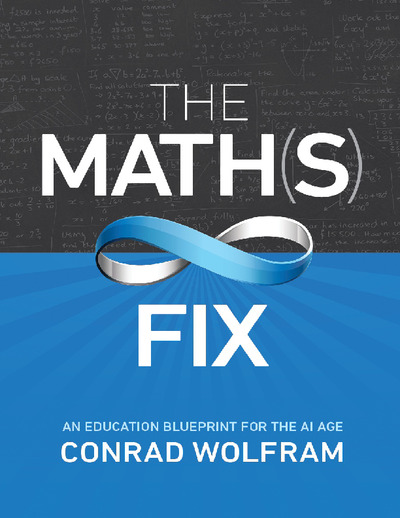 Zusammenfassungen
Zusammenfassungen
 Right at the centre of today’s school curriculum is maths. Like it or loathe it,
you can’t avoid it. As we enter the Artificial Intelligence or AI age, pressure
for school maths success has never been greater, because it seems so infused
in the progress of recent decades, and promises of those to come.
Right at the centre of today’s school curriculum is maths. Like it or loathe it,
you can’t avoid it. As we enter the Artificial Intelligence or AI age, pressure
for school maths success has never been greater, because it seems so infused
in the progress of recent decades, and promises of those to come.And yet, I think school maths is nearing a cliff-edge. Implausible though it may seem, I believe today’s mainstream subject, without reformation, will become a backwater for a few aficionados, and drop out of the mainstream— a bit like the demise of Latin in UK or European schools. (Latin or, more generally, classics was often considered the intellectual bedrock of learning until the 1970s.)
This book is about what the problem is, how it came about and how it can be solved. It takes a cold, hard look at what maths education is and lays out what it should be, not only to keep up with AI, but to empower humankind for this upcoming era. I am a supporter for what maths education can be, but not for much of what it is today.
 Why are we all taught maths for years of our lives? Does it really empower everyone? Or fail most and disenfranchise many? Is it crucial for the AI age or an obsolete rite of passage?
Why are we all taught maths for years of our lives? Does it really empower everyone? Or fail most and disenfranchise many? Is it crucial for the AI age or an obsolete rite of passage?
The Math(s) Fix: An Education Blueprint for the AI Age is a groundbreaking book that exposes why maths education is in crisis worldwide and how the only fix is a fundamentally new mainstream subject. It argues that today's maths education is not working to elevate society with modern computation, data science and AI. Instead, students are subjugated to compete with what computers do best, and lose.
This is the only book to explain why being bad at maths may be as much the subject's fault as the learner's: how a stuck educational ecosystem has students, parents, teachers, schools, employers and policymakers running in the wrong direction to catch up with real-world requirements. But it goes further too, for the first time setting out a completely alternative vision for a core computational school subject to fix the problem and seed more general reformation of education for the AI age.
 Bemerkungen zu diesem Buch
Bemerkungen zu diesem Buch
 Perhaps the most central question of this book is “What is the essence of our
core computational subject?”. If we fail to answer this correctly, we cannot
expect to set up education to optimise its learning. There are a host of
immediate supporting questions too. What are today’s mechanics of the
moment that go alongside actioning that essence? How do we educate our
populations in that essence with today’s mechanics, knowing that at least the
latter will evolve dramatically if not fundamentally change again during their
lives?
Perhaps the most central question of this book is “What is the essence of our
core computational subject?”. If we fail to answer this correctly, we cannot
expect to set up education to optimise its learning. There are a host of
immediate supporting questions too. What are today’s mechanics of the
moment that go alongside actioning that essence? How do we educate our
populations in that essence with today’s mechanics, knowing that at least the
latter will evolve dramatically if not fundamentally change again during their
lives? Kapitel
Kapitel 
- 1. Maths v. Maths
- 2. Why Should Everyone Learn Maths?

- 3. Maths and Computation in Today’s World
- 4. The 4-Step Maths/Computational Thinking Process

- 5. Hand Calculating: Not the Essence of Maths

- 6. «Thinking» Outcomes
 Dieses Buch erwähnt ...
Dieses Buch erwähnt ...
 Dieses Buch erwähnt vermutlich nicht ...
Dieses Buch erwähnt vermutlich nicht ... 
 Nicht erwähnte Begriffe | Bildungspolitik, Deutschland, Digitalisierung, Internet, Kompetenz, Lehrplan 21, Primarschule (1-6) / Grundschule (1-4), Schweiz, Unterricht |
 Tagcloud
Tagcloud
 Zitationsgraph
Zitationsgraph
 Zitationsgraph (Beta-Test mit vis.js)
Zitationsgraph (Beta-Test mit vis.js)
 2 Erwähnungen
2 Erwähnungen 
- Digitalisierung im Mathematikunterricht (Gilbert Greefrath, Reinhard Oldenburg, Hans-Stefan Siller, Volker Ulm, Hans-Georg Weigand) (2024)
- Handbuch Lernen mit digitalen Medien (3. Auflage) - Wege der Transformation (Gerold Brägger, Hans-Günter Rolff) (2025)
- Generative Machine-Learning-Systeme - Die nächste Herausforderung des digitalen Leitmedienwechsels (Beat Döbeli Honegger) (2025)


- Generative Machine-Learning-Systeme - Die nächste Herausforderung des digitalen Leitmedienwechsels (Beat Döbeli Honegger) (2025)
 Volltext dieses Dokuments
Volltext dieses Dokuments
 Anderswo suchen
Anderswo suchen 
 Beat und dieses Buch
Beat und dieses Buch
Beat hat dieses Buch während seiner Zeit am Institut für Medien und Schule (IMS) ins Biblionetz aufgenommen. Beat besitzt kein physisches, aber ein digitales Exemplar. (das er aber aus Urheberrechtsgründen nicht einfach weitergeben darf). Es gibt bisher nur wenige Objekte im Biblionetz, die dieses Werk zitieren.










 Computer
Computer Denken
Denken Eltern
Eltern Gesellschaft
Gesellschaft Kinder
Kinder Künstliche Intelligenz (KI / AI)
Künstliche Intelligenz (KI / AI) LehrerIn
LehrerIn Lernen
Lernen Mathematik
Mathematik Problem
Problem Problemlösefähigkeit
Problemlösefähigkeit Prüfung
Prüfung Schule
Schule
 , 140 kByte)
, 140 kByte)  Biblionetz-History
Biblionetz-History